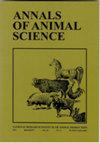罗非鱼饲料中选择植物蛋白替代鱼粉的综述和荟萃分析
IF 2.2
4区 农林科学
Q2 AGRICULTURE, DAIRY & ANIMAL SCIENCE
引用次数: 2
摘要
摘要罗非鱼中植物蛋白源替代鱼粉的研究已经开展了许多。为了量化用植物蛋白源替代鱼粉对罗非鱼生长性能的影响,采用meta分析方法。尽管存在高度异质性和漏斗图不对称,但meta分析显示,用植物蛋白源替代鱼粉对罗非鱼的生长性能有显著的积极影响。因此,罗非鱼似乎预先适应了利用植物蛋白来源。此外,还探讨了常用植物原料(大豆、向日葵、菜籽油、棉籽、基库尤和杜鹃花)的饲料价值、营养品质和成本。利用Excel中的Solver函数,以植物粕为原料,计算出最低成本的日粮。杜鹃花的营养指数最高,为9.7436。这是由于其优良的氨基酸结构,超过罗非鱼的需求。基库尤的氨基酸指数最低,为0.4918,营养指数和饲料价值最低。这些结果表明,氨基酸谱比蛋白质含量百分比在营养品质的测定中更重要。在罗非鱼饲料中,豆粕和豆粉是替代鱼粉的较好选择。本文章由计算机程序翻译,如有差异,请以英文原文为准。
A review and meta-analysis of selected plant protein sources as a replacement of fishmeal in the diet of tilapias
Abstract Numerous studies on the replacement of fishmeal with plant protein sources in tilapias have been undertaken. In order to quantify the effect of replacing fishmeal with plant protein sources on the growth performance of tilapias, a meta-analysis approach was applied. Despite the high heterogeneity and funnel plot asymmetry, the meta-analysis showed that replacing fishmeal with plant protein sources has a significant positive effect on the growth performance of tilapias. Thus, tilapias appear to be preadapted to utilizing plant protein sources. Furthermore, the feed value, nutritional quality and cost of the commonly used plant ingredients (soybean, sunflower, canola, cottonseed, kikuyu and azolla meals) were explored. The Solver function in Excel was used to formulate least-cost diets using the plant meals. Azolla had the highest nutritional index (9.7436). This was attributed to its excellent amino acid profile that exceeded the requirements of tilapias. Nutritional index and feed value were lowest in kikuyu because of its poor amino acid profile as it registered the lowest amino acid index (0.4918). These results indicate that the amino acid profile is more important in the determination of nutritional quality than the percent protein content. Azolla and soybean meal are good candidates for the replacement of fishmeal in the diets of tilapias.
求助全文
通过发布文献求助,成功后即可免费获取论文全文。
去求助
来源期刊

Annals of Animal Science
农林科学-奶制品与动物科学
CiteScore
4.00
自引率
5.30%
发文量
138
审稿时长
6-12 weeks
期刊介绍:
Annals of Animal Science accepts original papers and reviews from the different topics of animal science: genetic and farm animal breeding, the biology, physiology and reproduction of animals, animal nutrition and feedstuffs, environment, hygiene and animal production technology, quality of animal origin products, economics and the organization of animal production.
 求助内容:
求助内容: 应助结果提醒方式:
应助结果提醒方式:


